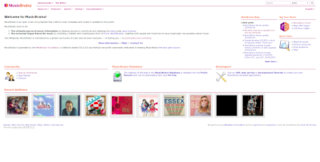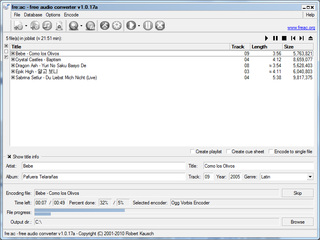
MusicBrainz is a MetaBrainz project that aims to create a collaborative music database that is similar to the freedb project. MusicBrainz was founded in response to the restrictions placed on the Compact Disc Database (CDDB), a database for software applications to look up audio CD information on the Internet. MusicBrainz has expanded its goals to reach beyond a CD metadata storehouse to become a structured online database for music.

Windows Media Player (WMP), currently known as Windows Media Player Legacy since 2022, is the first media player and media library application that Microsoft developed to play audio and video on personal computers. It has been a component of the Microsoft Windows operating system, including Windows 9x, Windows NT, Pocket PC, and Windows Mobile. Microsoft also released editions of Windows Media Player for classic Mac OS, Mac OS X, and Solaris, but has since discontinued them. Since 2022, it has been branded with the Legacy suffix to distinguish it from the new UWP-based Media Player introduced in Windows 11.

A CD ripper, CD grabber, or CD extractor is software that rips raw digital audio in Compact Disc Digital Audio (CD-DA) format tracks on a compact disc to standard computer sound files, such as WAV or MP3.

RealPlayer, formerly RealAudio Player, RealOne Player and RealPlayer G2, is a cross-platform media player app, developed by RealNetworks. The media player is compatible with numerous container file formats of the multimedia realm, including MP3, MP4, QuickTime File Format, Windows Media format, and the proprietary RealAudio and RealVideo formats. RealPlayer is also available for other operating systems; Linux, Unix, Palm OS, Windows Mobile, and Symbian versions have been released.

The Gravis UltraSound or GUS is a sound card for the IBM PC compatible system platform, made by Canada-based Advanced Gravis Computer Technology Ltd. It was very popular in the demoscene during the 1990s.

The Personal Jukebox was the first consumer hard drive-based digital audio player. Introduced in 1999, it preceded the Apple iPod, SanDisk Sansa, and other similar players. It was designed and developed by Compaq Research starting in May 1998. Compaq did not release the player themselves, but licensed the design to HanGo Electronics Co., Ltd. of South Korea.

Streamium was a line of IP-enabled entertainment products by Dutch electronics multi-national Philips Consumer Electronics. Streamium products use Wi-Fi to stream multimedia content from desktop computers or Internet-based services to home entertainment devices. A Streamium device plugged into the local home network will be able to see multimedia files that are in different UPnP-enabled computers, PDAs and other networking devices that run UPnP AV MediaServer software.
PLS is a computer file format for a multimedia playlist. It is typically used by media players for streaming media over the Internet, but may also be used for playing local media.

The Dell Digital Jukebox or just Dell DJ is a brand name for a series of digital audio players sold by the Dell corporation.

JRiver Media Center is a multimedia application that allows the user to play and organize various types of media on a computer running Windows, macOS, or Linux operating systems. Developed by JRiver, Inc., it is offered as shareware.

Yahoo! Music was a brand under which Yahoo! provided a variety of music services, including Internet radio, music videos, news, artist information, and original programming. Previously, users with Yahoo! accounts could gain access to hundreds of thousands of songs sorted by artist, album, song and genre.

SonicStage is a discontinued software product from Sony that is used for managing portable devices when they are plugged into a computer running Microsoft Windows. It comprises a music player and library manager, similar to iTunes, Windows Media Player and RealPlayer. It is used to manage the library of ATRAC and MP3 recordings on a PC.

Lyra is a series of MP3 and portable media players (PMP). Initially it was developed and sold by Indianapolis-based Thomson Consumer Electronics Inc., a part of Thomson Multimedia, from 1999 under its RCA brand in the United States and under the Thomson brand in Europe. There were also RCA/Thomson PMPs without the Lyra name, such as the RCA Kazoo (RD1000), RCA Opal and RCA Perl. In January 2008, Thomson sold its Consumer Electronics part including the RCA brand and Lyra line to AudioVox. RCA-branded PMPs are still being made today in its domestic market but no longer under the Lyra name. The Lyra was an early pioneer in digital audio players, although in later years most of its output were OEM products.
Yahoo! Music Jukebox, formerly known as Yahoo! Music Engine, was a freeware music player released by Yahoo! in 2005 to compete with iTunes and Rhapsody in the digital music market. Developed side-by-side with MusicMatch Jukebox, another music player acquired by Yahoo! in 2004, it was designed to be the main client for Yahoo's array of music services, which were centered around Yahoo! Music Unlimited, a paid music streaming service and digital music store; in addition to being a music management software. In early 2008 Yahoo! sold off its music assets, including Yahoo! Music Jukebox to RealNetworks' Rhapsody and replaced it with a web-based music player.

Logic Studio is a discontinued professional music production suite by Apple Inc. The first version of Logic Studio was unveiled on September 12, 2007. It claims to be the largest collection of modeled instruments, sampler instruments, effect plug-ins, and audio loops ever put in a single application.

The Archos Jukebox is a series of Archos portable audio players from 2000 through 2002.
Total Recorder is digital audio editor software from High Criteria, Inc. which is able to record any sound coming through a computer soundcard. In addition to recording through a soundcard, Total Recorder is able to record digital sound directly through its virtual sound driver. This driver provides an advantage of recording audio reproduced by an external program directly in digital format, i.e. without digital-analog-digital conversions leading to loss of quality, and even in those cases when a computer soundcard has no loop-back line. Total Recorder is a shareware program. Evaluation version of Total Recorder is a fully functional version of the program, with the exception that an audible noise will be inserted about every 60 seconds.
Mic in track was the default name of a file created after recording with the program MusicMatch Jukebox. In the late 1990s and early 2000s, Mic in track files began appearing on file-sharing networks such as Napster, usually without the knowledge of their creators. Because of the unique name, voyeurs could easily search for the files and listen to audio of unknowing individuals performing karaoke or joking around with friends. Several websites are devoted to cataloging and featuring their favorite Mic in track files.

Media Go is a media player and media library application that runs on Microsoft Windows and was developed by Sony Entertainment Network. The software organizes and plays a wide variety of multimedia content including video, music, podcasts and photos, and can share them in a network as a DLNA server. Media Go also manages content on various Sony mobile devices including the PlayStation Portable, PlayStation Vita, Walkman, Sony Tablet, and Xperia. Gracenote tagging is integrated, and in the past it also had a storefront from PlayStation Network and mora for purchasing media content.
The French consumer electronics company Archos manufactured a number of products which have since been discontinued.















